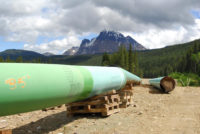Energy Construction
Terminated Keystone XL Oil Pipeline Site Closure Steps Are Still in Play
Competing Enbridge Line 3 wins much watched Minnesota ruling June 14 to continue construction

TC Energy, the Calgary-based firm developing the the Keystone XL pipeline, said June 9 it will terminate the long controversial project, which would have carried 830,000 barrels daily of crude oil from Alberta to Steele City, Neb., and now is weighing site closure issues on various fronts.
The decision follows President Joe Biden's Jan. 20 order revoking the permit for the $8-billion project as one of his first presidential actions. The company halted construction at the time and said it would review its options.
Keystone’s Canadian leg had been under construction for months after the Alberta government agreed to invest about $1.1 billion in the project last year. “We continue to be disappointed and frustrated with the circumstances surrounding the Keystone XL project,” said Premier Jason Kenney. He has not aired whether the province will seek compensation through NAFTA or through the courts.
TC Energy had announced last October construction awards to six U.S. contractors, and had built about 150 kilometers of Keystone XL in Canada in 2020, as well as a border crossing into Montana.
Meanwhile, a key Keystone-XL competing oil carrier, Enbridge Line 3, won a much watched state appeals court panel ruling on June 14 to continue construction in Minnesota that would complete the Alberta to Wisconsin line, possibly by end of year. In a 2-1 decision, judges upheld a state regulator's order that there is sufficient need for the replacement line. Project opponents, which have held large site protests in recent days, could appeal to the state supreme court, and also await a federal court judgement in a challenge of the project's clean water permit.
TC Energy did not provide any details on the scope and timing of its plan to demobilize construction sites or on disposition of already installed pipe. About 1,000 jobs could be affected. It stated it will “continue to coordinate with regulators, stakeholders and Indigenous groups to meet its environmental and regulatory commitments and ensure a safe termination of and exit from the project.”
The company said in a regulatory filing that it intends to leave in place, for now, the line and two pump stations built in Alberta, with mitigation of the construction area underway, according to a Canada cbc.com report. The builder also is developing a "longer term plan to deal with the assets," including sale of unused materials, it told the publication. About 250-300 workers are involved in the current work.
About 48,000 tons of pipe are stored in yards along the planned Canada-US route, with materials also stored and site prep started for 10 pump stations and 11 work camps, said National Geographic. Plans for their disposition have not been announced, with issues also unsettled as to land easements along the original route. Project opponents have asked Nebraska regulators to revoke its private-land easements in the state.
TC Energy recorded record profit last year on existing oil and natural gas operations, according to reports. But the firm took a roughly $1.8-billion impairment charge for the Keystone XL suspension and reported in May a first-quarter 2021 loss.
Pipelines Besieged
Project delays had put it in greater competition with the Canada-government-owned Trans Mountain oil pipeline and Enbridge's Line 3, both completing much-challenged expansions, in an energy supply market transitioning to cleaner sources.
Meanwhile, on June 9, Pembina Pipeline Corp., Canada's third largest pipeline firm, linked with an indigenous group to make an offer to buy Trans Mountain, according to Bloomberg. No purchase price was disclosed. That venture now is competing with another indigenous group bidder to own the line when its expansion is finished possibly by next year and Canada said it would entertain a sale. The government bought Trans Mountain in 2018 for $3.7 billion to complete an upgrade on what is the only oil line from Alberta to the Pacific coast..
TC Energy had floated an earlier plan to build and operate Keystone-XL with “net-zero emissions throughout its life cycle,” but said it would now “continue to identify opportunities to apply this level of ingenuity across our business going forward, including our current evaluation of the potential to power existing US assets with renewable energy.”
But environmental advocacy groups will likely use the termination in their fight against other projects.
“The fight to stop Keystone XL was never about one pipeline,” said Kendall Mackey, an activist with 350.org. The termination “sets precedent ... to stop Line 3, Dakota Access, and all fossil fuel projects.”
But industry supporters noted economic impacts. “President Biden killed the Keystone XL Pipeline and with it, thousands of good-paying American jobs,” said Sen. John Barrasso (R-Wyo.), ranking member of the Senate Committee on Energy and Natural Resources, in a statement.
Wyoming in March joined 20 other states in a lawsuit seeking to block Biden's cancellation of the project.





